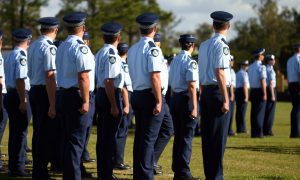***IMPORTANT***The Information below may have change. Therefore, please visit the TX law enforcement agency you are interested in applying to.
To become a police officer in Texas for even the smallest jurisdiction candidates must hold a Peace Officer License or be eligible for a license from the Texas Commission on Law Enforcement (TCLEOSE), a state agency.
To be eligible for that license, candidates must meet minimum requirements, complete a full-time Basic Peace Officer Certification course and then pass the basic peace officer licensing exam that is given at TCLEOSE headquarters in Austin, as well as other authorized testing centers elsewhere in the state. The actual licensing takes place only after a police agency sends a completed license application to the commission.
There are dozens of commission-licensed law enforcement academies throughout the state that candidates may attend to complete the Basic Peace Officer Certification course. A complete list of these can be found on the TCLEOSE web side at http://www.tcleose.state.tx.us. In order to enroll in one of these academies, candidates must meet minimum requirements for training. Academies have the right to establish additional requirements of standards.
Minimum Requirements for Law Enforcement Training in Texas
To be eligible for law enforcement training in Texas, candidates must:
- Be a U.S. Citizen, never convicted of any family violence offense and not prohibited from driving a motor vehicle or carrying a firearm;
- Not currently be charged with a criminal offense which, if convicted, would bar being licensed, never have been on court-ordered community supervision or probation for a Class B misdemeanor or above within the last 10 years from the date of the court order, and never have been convicted of a Class B misdemeanor or above within the last 10 years;
- Have a high school diploma or high school equivalency certificate or an honorable discharge from the armed forces of the United States with at least 24 months of active duty service;
- Be physically fit to perform all the duties of a peace officer, declared in writing by a medical professional, show no evidence of drug use or dependency after a physical examination, blood test or other medical test; and declared in writing by a medical professional to be in satisfactory psychological or emotional health.
Requirements to be Licensed as a Peace Officer in Texas
To be licensed as a Peace Officer in Texas, a candidate must be at 21 year old or 18 with an Associate Degree from an accredited college or university, or honorably discharged from the U.S. military with at least 24 months of service. No individual who has been discharged from the military under less than honorable conditions may be licensed. Other requirements include but are not limited to:
- Never having a commission license denied or under suspension or voluntarily suspended;
- Meeting minimum education training requirements and passing the licensing examination;
- Passing a criminal background check to verify the candidate is has not been convicted of a Class B misdemeanor or above and
- Passing physical and drug testing as attested to by a medical professional in writing.
The complete list of requirements and details can be found on the TCLEO web site.
BASIC REQUIREMENTS FOR TX TROOPER
All applicants must meet the basic requirements outlined below for entrance into training for the position of Trooper in any of the following four (4) field Services: Highway Patrol; License and Weight; Vehicle Inspection; and Driver License Division.
Age: Applicant must be at least 20 years of age on the date of probationary appointment to the position of Trooper-Trainee. There is no maximum age limit.
Physical: Before employment, each applicant will be examined by a physician.
Vision: Visual Acuity – Maximum uncorrected visual acuity of 20/200 and correctable or corrected as follows:
20/30 thru 20/40 – correctable to 20/30 in each eye and binocularly.
In excess of 20/40 thru 20/100 – must be corrected to 20/30 in each eye and binocularly by means of regular eyeglasses or contact lenses.
In excess of 20/100 thru 20/200 – must be corrected to 20/30 in each eye and binocularly by contact lenses and a statement from an ophthalmologist that no ocular disease exists.
Field of Vision – Horizontal 60-85 degrees temporally from a central fixation point.
Muscular Imbalance – Zero vertical deviation. Horizontal – 5 prism diopters exophoria at 20 feet, 10 prism diopters esophoria at 20 feet, 10 prism diopters exophoria at 20 feet.
Other Visual Factors – Applicants will be rejected for color dificiencies as determined by Department of Public Safety testing, chronic inflammation of the eye or adnexa, or permanent abnormalities of either eye (including cataracts, corneal opacities, paralysis of ocular muscles, etc.). Loss of either eye will reject.
Education: Applicants must have a minimum of 60 semester hours from an accredited college or university. Required semester hours may be substituted for by prior law enforcement experience at the following ratios:
Semester
Hours Law Enforcement
Officer Experience
0-15 plus 24 Months or more
16-30 plus 18 Months or more
31-45 plus 12 Months or more
46-59 plus 6 Months or more
Twenty-four (24) months military experience may be substituted for the entire 60 semester hours.
Military experience is defined as having received an honorable discharge from the Armed Forces of the United States after at least two (2) years of active service.
Law Enforcement Officer experience is defined as time spent as a full-time paid employee performing police duties in a position which requires a license as a Texas Peace Officer or its equivalent in another State.
All military or law enforcement experience substituted for college semester hours must be verifiable.
Citizenship: Must be a citizen of the United States.
Texas Driver License: Applicants must possess a valid Texas driver license.
Examination: Each applicant must obtain a satisfactory grade on physical examinations, oral examination interview, and other portions of the screening process.
Character: Applicants must be of good moral character and habits. A final conviction for any DWI, DUID, Misdemeanor crime of domestic violence, or felony will automatically disqualify applicant. A probation for DWI, DUID or felony will be considered a final conviction. Applicants will be investigated as to the truth of the statements made in their applications or during oral interviews, their character, habits, previous employment, and other matters necessary to establish the qualities of the individual.
Traffic Record:
- Applicants must not have been convicted of four (4) or more hazardous traffic violations within twelve (12) months preceding date of application.
- Applicants must not have been convicted of seven (7) or more hazardous traffic violations within twenty-four (24) months preceding date of application.
- Applicants should not have been convicted as a habitual violator within the last five (5) years preceding date of application.
- Applicants should not have been convicted of FSRA.
- Applicants should not have been convicted of DWLS within the last five (5) years.
- Applicants must not currently be on probation for any traffic offense.
TRAINING – ASSIGNMENTS – COMPENSATION – BENEFITS
Training: Basic training for Trooper-Trainees will be conducted at the Law Enforcement Academy in Austin and all students will be required to live at the Academy. Weekend leaves will be permitted provided the student has been performing satisfactorily. Students are not encouraged to move their families to Austin during this training period. The basic training is twenty-six (26) weeks in length.
A fee will be charged for room and board during the training period at the Academy.
By State statute, all Trooper-Trainees will be required to submit to and pass a drug screening test prior to graduating from the DPS Academy.
All Trooper-Trainees successfully completing the DPS Academy will be required to pass a written licensing test administered by the Texas Commission on Law Enforcement Officer Standards and Education.
Assignments: Applicants must be willing to accept assignment anywhere in the State of Texas and in any uniformed Service of the Department. When practical, consideration is given to the students’ preference of Service and station.
Hazardous Duty Pay: Commissioned law enforcement personnel of the Department will be paid hazardous duty pay at the rate of $7.00 per month for each year of service in law enforcement up to and including thirty (30) years of service.
Traveling Expenses: After the assignment of a home station, expenses which are incurred away from your home station will be reimbursed as provided by state law.
Uniforms and Equipment: Headgear, shirts, trousers, jackets, guns, badges, belts, and other items are furnished. Motor vehicle furnished as required by assignment.
Vacation: Two weeks annually as provided by law.
Holidays: About twelve (12) days granted each year; others occasionally granted.
Sick Leave: Sick leave with full pay for regular employees of the State may be allowed at the rate of one (1) day per month of employment, and an unlimited amount of sick leave may be accrued.
Insurance: Life, hospital and surgical benefits are provided for all employees at no cost to the employee. Health care insurance for dependents and additional life benefits are available as optional coverage at employee’s expense. Department of Public Safety Mutual Association life insurance benefits are available at low rates.
Retirement: State Employees Retirement System provides for the retirement of law enforcement officers after twenty (20) years of service. Social Security benefits are provided aside from the regular retirement plan.
Salary: See attached salary schedule. Deductions from monthly salary will be made for Internal Revenue Withholding Tax (according to number of dependents claimed), Social Security, and for Employees Retirement System of Texas (6%).
Graduates from the Academy receive a salary increase and are placed on twelve (12) months probation at the time they are commissioned as a Probationary Trooper I.
After completion of six (6) months of satisfactory probationary service, the Probationary Trooper I will receive a salary increase. A Probationary Trooper I who successfully completes twelve (12) months probation will be advanced to the position of Trooper I and receive a salary increase.
Promotion: A Trooper I who has completed a minimum of four (4) years as a commissioned Trooper with the Texas Department of Public Safety and meets other qualifications is eligible for consideration for promotion to the position of Trooper II. After a total of eight years experience Trooper II’s are eligible to promote to the position of Trooper III. After a total of twelve (12) years experience Trooper III’s are eligible to promote to the position of Trooper IV. After sixteen (16) years of experience Trooper IV’s are eligible to promote to Senior Trooper. Officers who have attained Trooper II status or above are eligible to compete for the position of Sergeant. See attached schedule for Trooper II, Trooper III, Trooper IV, and Senior Trooper salaries.







